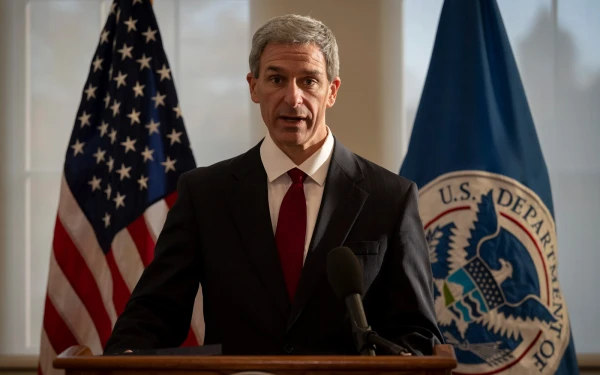Catholics who do not participate in demonstrations against immigration control organized by senior Catholic prelates make up a “silent majority,” according to conservative Catholic immigration experts.
As the Trump administration’s immigration control measures intensify, Catholics across the country are holding days of prayer and public witness for migrants through initiatives such as “One Church, One Family”promoted by the Jesuits. However, according to some conservative Catholic immigration experts, the number of Catholics who choose not to participate in these vigils represents a “silent majority.”
Receive the main news from ACI Prensa by WhatsApp and Telegram
It is increasingly difficult to see Catholic news on social media. Subscribe to our free channels today:
The initiative urges dioceses, parishes, schools, religious communities and other Catholic institutions to organize and promote “public actions that dignify migrants,” such as “a vigil in front of a detention center, a prayer service in a place where migrants were publicly detained, or praying the rosary to accompany people heading to immigration court hearings.”
“I think there are a large number of American Catholics who support the president’s actions on immigration,” Andrew Arthur, resident researcher at the Center for Immigration Studies, told CNA. “I think he obtained the majority of the Catholic vote in the last elections, according to the survey consulted,” he added.

Enforcement of immigration laws, he noted, was a key pillar of Donald Trump’s 2024 presidential campaign. The president’s failure to place greater emphasis on this key issue during the 2020 campaign was also considered “one of the main mistakes” of his second attempt at the White House.
While Catholics who oppose the Trump administration’s immigration control measures have openly defended migrants, organizing vigils, Eucharistic processions and protests, Arthur noted that the population of Catholics who support the government “is not a monolithic bloc” and does not organize demonstrations in the same way.
“I don’t really know of any large Catholic advocacy group that I can target,” he said in terms of an open defense of the measures. “But that was more or less to be expected. In my opinion, this is the silent majority in this country,” he said.
“One of the things we observed is that the Catholic Church, anecdotally, especially younger Catholics, are more conservative and therefore more agreeable with law enforcement in general and immigration enforcement in particular,” he continued. “But there is no reason to form a group that supports what the administration is doing,” he said.
Regarding concerns raised by many groups, including the United States Conference of Catholic BishopsArthur insisted that “there is nothing that Donald Trump, ICE or (border czar) Tom Homan, another good Catholic, are doing that is contrary to the laws enacted by Congress.”
Despite widespread critical discourse, Arthur denied that there was anything particularly exceptional or specific about the Trump administration’s approach to law enforcement.
“I have been involved in immigration and immigration control issues for 33 years and have worked with four different presidents, starting with George HW Bush,” he declared. “There is nothing about immigration enforcement today that is different than what was done under HW, Clinton, George W. Bush or Barack Obama.”
“This is what the law requires”
“This is what the law requires. This is what officers do,” he continued, adding, “I think the only thing really exceptional is the response they’re getting.”
Addressing law enforcement concerns from a Catholic perspective, former U.S. Acting Undersecretary of Homeland Security Ken Cuccinelli told CNA: “I know the two basic points of the Catholic catechism paragraph on immigration: 1) Wealthier nations must be generous with their immigration policies; and 2) Migrants must respect the laws and customs of the country to which they immigrate.”
“I believe that the United States is historically the most generous nation in the world when it comes to welcoming people from all over the planet, so we meet the first Catholic expectation,” he continued, adding: “However, an illegal immigrant, by definition, does not meet the second expectation of the catechism, and therefore, it is necessary for the United States to apply the law rigorously.”

Cuccinelli emphasized the need for the US immigration system to work for Americans first, as well as the negative economic consequences for poor working-class Americans of allowing mass illegal immigration of low-skilled workers.
Finally, Cuccinelli, who was also director of the United States Citizenship and Immigration Services, told CNA that he hopes that the Trump administration’s efforts to demonstrate its commitment to the rule of law will prompt “a gradual return to a legal immigration regime soon.”
Charles Nemeth, director of the Center for Criminal Justice, Law and Ethics at the Franciscan University of Steubenville, also spoke on the issue from a Catholic perspective, telling CNA: “If it comes to justice, it is better to adopt the Aristotelian-Thomistic view that justice is based on what is right, no more and no less. Undocumented immigrants begin their journey already in a state of guilt, since they have broken the rules and ignored our laws and traditions.”
For a society to be just, he stated, it must prioritize the common good of the nation-state rather than “the individualized needs or demands of those who lack the legal right to assimilate without abiding by the rules and regulations required by entry to the border.”
Nemeth stated that the Biden administration’s “open door” policy undermined the rights of American citizens by allowing mass migration, which he said resulted in “a drastic increase in crime and social unrest, and turned the rule of law into a sham.” Additionally, he mentioned undocumented immigrants’ access to benefits such as health care, food stamps and education, “while our own citizens are suffocated by the cost of those same services.”
“It is one thing to show compassion,” referring to Catholics protesting against the government’s coercive measures, “and quite another to undermine the social fabric of a society that allows special rules for certain categories of inhabitants.”
Translated and adapted by the ACI Prensa team. Originally published in CNA.

